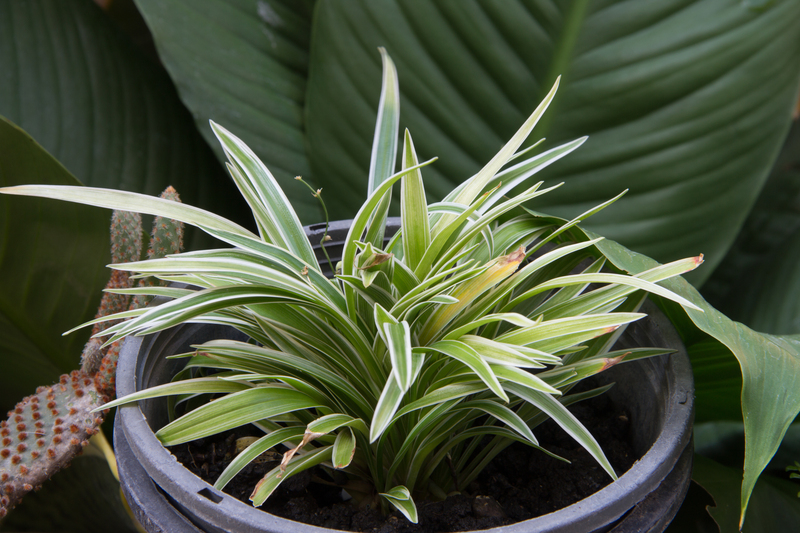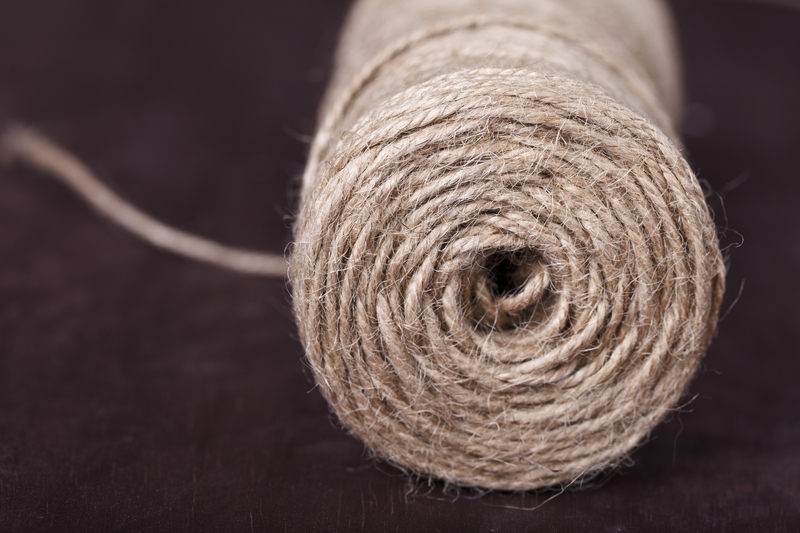Organic Waste to Treasure: Creating Nutrient Soil
Posted on 01/06/2025
Organic Waste to Treasure: Creating Nutrient Soil
In our modern world, where environmental issues are growing and sustainability is essential, transforming organic waste into nutrient-rich soil has never been more relevant. Household food scraps, yard clippings, and even certain types of paper can all be recycled into organic treasure that enhances gardens, supports agriculture, and reduces landfill waste. In this comprehensive guide, you'll discover why and how to turn your everyday refuse into a valuable resource.

Why Converting Organic Waste is Important
The Environmental Impact
Millions of tons of organic material end up in landfills each year. When left to decompose anaerobically, organic waste produces methane, a potent greenhouse gas that contributes to climate change. Redirecting this waste, and instead creating nutrient soil through composting or other processes, can dramatically lower harmful emissions.
The Benefits of Nutrient-Rich Soil
- Enhanced Plant Growth: Compost and organic matter improve soil structure, increases water retention, and provide an array of nutrients plants need.
- Waste Reduction: Composting diverts organic waste from landfills, reducing overall garbage output and landfill space.
- Cost Savings: By creating your own soil amendments, you save money on fertilizer and garden products.
- Healthy Ecosystems: Organic soil supports a thriving community of beneficial microbes, earthworms, and other organisms.
- Cleaner Environment: Reducing landfill waste translates into improved air and water quality.
Types of Organic Waste
Not all organic materials are created equal when it comes to transforming waste into nutrient-dense soil. Below are common types suitable for composting and some that should be avoided.
Green vs Brown Waste
- Green Waste: Includes food scraps, grass clippings, coffee grounds, and fresh garden trimmings. These are nitrogen-rich and vital for microbial activity.
- Brown Waste: Comprises leaves, straw, cardboard, sawdust, and small branches. These carbon-rich materials provide the energy necessary for decomposition.
What Not to Compost
- Meat and Dairy: Attract pests and decompose poorly.
- Oily Foods and Fats: Slow down the decomposition process and create odors.
- Sick Plants: May spread diseases in your soil.
- Pet Waste: Can contain harmful pathogens.
Composting: The Most Popular Method of Turning Waste Into Nutrient Soil
What is Composting?
Composting is the natural process of breaking down organic waste through microbial and fungal action, transforming it into humus--a crumbly, nutrient-rich soil amendment. Effective composting creates the ideal environment for these organisms to thrive and work efficiently.
Types of Composting
- Backyard Composting: Uses open piles or bins, ideal for homeowners with gardens.
- Vermicomposting: Employs worms (often red wigglers) to digest food scraps, producing worm castings famed for their soil-enriching properties.
- Bokashi Composting: A fermentation technique using effective microbes, especially suitable for small urban spaces and kitchens.
- Industrial or Municipal Composting: Large-scale operations that process organic waste from entire communities.
How to Start Composting at Home
Gathering the Right Materials
Starting a compost bin is remarkably simple. Collect a balanced mix of green and brown organic materials to layer in your pile. Remember to chop or shred larger items to speed up decomposition.
Setting Up Your Compost Pile or Bin
- Choose a Suitable Location: Pick a dry, shaded spot near a water source and away from neighbors.
- Layer Materials: Start with coarse brown material (twigs, straw), followed by alternating layers of greens and browns.
- Maintain Moisture: The pile should be as moist as a wrung-out sponge. Add water if it's dry or add more browns if too wet.
- Aerate Regularly: Turn the pile every week or two to introduce oxygen and accelerate the composting process.
- Monitor Temperature: A healthy compost pile heats up in the center. If it gets cool, aerate and check your layer balance.
Troubleshooting Compost Problems
- Bad Odors: Usually a sign of excess moisture or too many greens. Add browns and turn the pile.
- Pile Not Heating: Likely too dry or lacks greens. Adjust balance and water lightly if needed.
- Attracting Pests: Bury food scraps in the center and exclude meat or fats.
Vermicomposting: Turn Kitchen Scraps Into Black Gold
Another ingenious method to transform organic waste into nutrient-rich soil is vermicomposting. Through the help of earthworms, especially red wigglers, you can speedily convert fruit peels, coffee grounds, and paper into "worm castings." These castings are packed with nutrients prized by gardeners.
How to Set Up a Worm Bin
- Obtain a Bin: Use a simple plastic bin with holes drilled for ventilation and drainage.
- Prepare Bedding: Shredded newspaper, coconut coir, or leaves provide a habitat for worms.
- Add Worms: Red wigglers are ideal for indoor composting.
- Feed Gradually: Start with small amounts of kitchen waste. Avoid citrus, onions, and spicy food scraps.
- Harvest Finished Castings: Every few months, harvest the nutrient-rich castings to use as fertilizer or soil amendment.
Using Finished Compost: Creating Nutrient-Dense Soil
How Do You Know Compost is Ready?
When your compost is finished, it will look, feel, and smell like dark, crumbly soil--rich, earthy, and pleasant. If you see large, non-decomposed pieces, sift them out and return them to the pile.
Ways to Use Your Organic Treasure
- In the Garden: Mix finished compost into planting beds to improve fertility and structure.
- For Lawns: Broadcast a thin layer as a natural fertilizer.
- Potted Plants: Stir into potting soil for added nutrients.
- Mulching: Use as a top layer to suppress weeds, retain moisture, and insulate roots.
Other Technologies for Creating Nutrient Soil from Waste
Biochar
Biochar is a stable, carbon-rich material produced by heating organic waste in the absence of oxygen, a process called pyrolysis. Mixing biochar into soil increases fertility, water retention, and carbon sequestration.
Anaerobic Digestion
This process uses bacteria to break down organic waste in airtight containers, producing nutrient-rich digestate (a great soil amendment) and biogas, which can be used for energy.
Organic Waste Beyond Your Backyard: Community and Commercial Initiatives
Municipal Composting Programs
Many cities now offer curbside organic waste collection or local drop-off for foodwaste and yard waste, striving to divert valuable organic matter from landfills. Participation in these programs ensures even those without backyard space can contribute to soil regeneration.
Farm and Agricultural Uses
On a larger scale, agricultural composting transforms crop residues, manure, and food waste into vast quantities of humus-rich soil, supporting sustainable farming.
The Science Behind Turning Organic Waste Into Nutrient Soil
Lifecycle of Decomposition
Microorganisms--including bacteria, fungi, and actinomycetes--are the powerhouse converters. They digest carbohydrates, proteins, and fats in waste, breaking them down into simple compounds that become plant-available nutrients.
Nutrient Cycles
As organic matter decays, key nutrients like nitrogen, phosphorus, potassium, and trace elements are released over time, gently fertilizing the soil without the hazards of chemical runoff.
Common Mistakes to Avoid When Creating Nutrient-Dense Soil from Waste
- Adding Inappropriate Materials: Avoid plastics, diseased plants, and chemicals.
- Poor Aeration: Stagnant piles slow decomposition and cause odor.
- Overlooking Moisture Balance: Too dry or too wet conditions hamper the composting process.
- Neglecting Pile Size: Very small piles may not heat up, while excessively large ones can be hard to manage.
- Impatience: Composting takes time. Allow several months for breakdown and maturation.
Best Practices for Organic Waste Management
- Source Separation: Set up bins in your kitchen for organic and non-organic materials.
- Reduce Food Waste: Only buy what you'll eat and use leftovers creatively.
- Engage the Community: Encourage schools, neighborhoods, and workplaces to join composting initiatives.
- Educate: Share the science and benefits of turning waste into nutrient soil to inspire participation.
Frequently Asked Questions About Organic Waste to Nutrient Soil
What if I don't have space for a compost pile?
Try vermicomposting with a worm bin under your kitchen sink, or participate in community compost programs.
Can compost attract pests?
If you avoid adding meats, oils, and dairy products, and bury food scraps within the pile, pests are easily deterred.
Is composting worth the effort?
Absolutely! The environmental impact, improved soil health, and cost savings are well worth the small investment of time and effort.

Conclusion: Transforming Organic Waste into Value
By embracing the process of turning organic waste into nutrient-rich soil, we each become stewards of the earth's natural cycles. Whether through backyard composting, worm bins, or participating in municipal programs, we reduce landfill waste, combat climate change, and create vibrant, healthy soils for gardening and farming. So next time you're faced with a pile of kitchen scraps or autumn leaves, remember: organic waste truly can be a treasure waiting to nurture new life!
Start Today: Make Nutrient Soil From Organic Waste
With simple actions and a little ingenuity, everyone can participate in the transformation of organic waste to treasure. Start collecting, composting, or joining local initiatives, and help create a greener, more sustainable future--one handful of nutrient-rich soil at a time.
Latest Posts
Discover the Joy of Container Gardening
Innovative Zen garden ideas for peaceful outdoor spaces
Transforming Your Yard into a Kid-Friendly Haven
Transforming Your Garden with Beautiful Seating Arrangements

